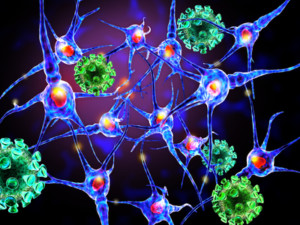Autoimmune Reaction & Neuropathy (nerve damage)
Autoimmune reaction and how it happens?
Autoimmune reaction means that the body creates an overactive immune response against substances and tissues normally present in the body. In other words, the body actually attacks its own cells.

Nerve Damage can occur when the body attacks its own nerve tissue. This occurs in Guillain-Barre syndrome, celiac disease, Crohn’s Disease, Fibromyalgia, Grave’s Disease, Irritable Bowel Syndrome (IBS), Inflammatory bowel disease, and many others.
Autoimmune disorders – An antigen is any substance that causes your immune system to produce antibodies against it. An antigen may be a foreign substance from the environment such as chemicals, bacteria, viruses, or pollen. An antigen may also be formed within the body, as with bacterial toxins.
An Autoimmune disorder is defined as when the immune system can’t tell the difference between healthy body tissue and antigens. It is when specialized cells and antibodies of the immune system attack the body’s own tissues.
Viral and bacterial infections can cause indirect nerve damage by creating conditions referred to as autoimmune disorders.
How does this become neuropathy?
The autoimmune attack where the body is attacking its own tissue typically causes destruction of the nerve’s myelin sheath of the axon (the long fiber that extends out from the main nerve cell body). The myelin sheath is the outer covering of the axon. This destruction is nerve damage. It is also called Neuropathy.
See Neuropathy for more information on this, the symptoms of neuropathy and what can be done to get relief.
Gluten neuropathy
Neuropathy, or peripheral neuropathy, describes a range of disorders characterized by nerve damage to one or more nerves outside of the brain and spinal cord. Often autoimmune diseases and vitamin deficiencies are some of the potential causes, according to the Mayo Clinic. Gluten neuropathy is when the autoimmune response is the root cause of the nerve damage.
A study published in Muscle Nerve journal in December 2006 found that participants with neuropathy who followed a gluten-free diet showed significant improvement in symptoms after one year. The control group reported a worsening of symptoms. People who have gluten intolerance do not respond to simple allergy tests like someone with milk or nut allergy might. The gentlest way to figure out if someone is sensitive to gluten is dietary therapy. Avoid gluten for several weeks, then reintroduce it and observe any reactions.
Once it is known that a person has a problem with gluten there is only one form of treatment: abstinence. People with any degree of gluten sensitivity or intolerance must completely give it up. This means not only avoiding obvious foods like bread and pasta, but also foods like soy sauce and licorice that contain small amounts of wheat.
Fortunately, there are many alternatives. Pastas made with rice flour or quinoa* don’t have gluten in them. Rice bread can replace bread made from grains containing gluten. Buckwheat flour contains no gluten and works well for pancakes. Some companies even make soy sauce that doesn’t use wheat in the ingredients. It is simply a matter of reading labels and shopping around.
* Celiac disease: a digestive disease that damages the small intestine and interferes with absorption of nutrients from food.
* Neurologic: of or having to do with neurology. Neurology is a branch of medicine concerned especially with the structure, functions, and diseases of the nervous system.
* Quinoa: a grain-like plant.
What causes the Autoimmune Problem
Treatment for Neuropathy from the Autoimmune Reaction
There are many medications, and other remedies to bring relief, you can read it in this article Neuropathy Treatments
What can you do?
None of the various neuropathy treatments will build healthy nerves. You can cover up the symptoms and you can increase circulation, and you can make a person feel less pain, etc., but if you build healthy nerves, there will not be any symptoms (healthy nerves don’t hurt, tingle, burn, are not numb, etc.) and the relief will be lasting.
Building Healthy Nerves
Healthy sensory nerves mean that they are not painful. Healthy nerves mean that they communicate and don’t send wrong signals such as burning, hot and cold, tingling when there is no reason for it. Healthy motor nerves mean that they relay messages from the brain to the muscle so that they move correctly. Nerves need to be healthy to function properly.
The body needs specific nutrients (vitamins) to be able to build healthy nerves.
It may not give immediate relief (although many do feel changes in the first week) as the vitamins are working at a cellular level, but it does address the actual problem, builds healthy nerves and brings lasting relief.
(For temporary relief while building healthy nerves, go to Pain Relief Formula)
What can be done for lasting relief?
Find out how to Build Healthy Nerves
*Studies & Research on Nerve Health
Building a Healthy Immune System
STILL HAVE QUESTIONS? EMAIL AND GET YOUR QUESTIONS ANSWERED.
Sign up to receive the MCVitamins Newsletter!
Up-to-date info on the latest health-related news happening in the world
(available in English only)

